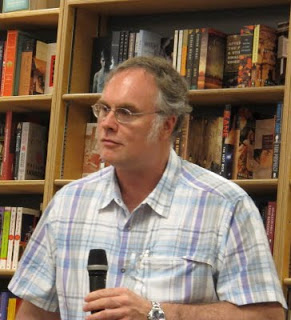Related Research Articles

Asperger syndrome (AS), also known as Asperger's, is a neurodevelopmental condition characterized by significant difficulties in social interaction and nonverbal communication, along with restricted and repetitive patterns of behavior and interests. The syndrome is no longer recognized as a diagnosis in itself, having been merged with other conditions into autism spectrum disorder (ASD). It was considered to differ from other diagnoses that were merged into ASD by relatively unimpaired spoken language and intelligence.
Developmental disorders comprise a group of psychiatric conditions originating in childhood that involve serious impairment in different areas. There are several ways of using this term. The most narrow concept is used in the category "Specific Disorders of Psychological Development" in the ICD-10. These disorders comprise developmental language disorder, learning disorders, motor disorders, and autism spectrum disorders. In broader definitions ADHD is included, and the term used is neurodevelopmental disorders. Yet others include antisocial behavior and schizophrenia that begins in childhood and continues through life. However, these two latter conditions are not as stable as the other developmental disorders, and there is not the same evidence of a shared genetic liability.

Landmark College is a private college in Putney, Vermont, designed exclusively for students who learn differently, including students with a learning disability, ADHD, autism or executive function challenges.
R. P. Hobson, or Peter Hobson, is a Professor of Developmental Psychopathology at University College London known for his work on autism and experimental child psychology. His research leads him to conclusions concerning the origins of consciousness, summarized in a book for the general reader, The Cradle of Thought.

Neurodiversity is a proposed framework that argues there is intrinsic diversity in human brain function and cognition, and that certain things currently classified as mental disorders are differences and disabilities but are not necessarily pathological. The framework grew out of the autism rights movement and builds on the social model of disability, arguing that disability partly arises from societal barriers, rather than attributing disability purely to inherent deficits. It instead situates human cognitive variation in the context of biodiversity and the politics of minority groups. Some neurodiversity advocates and researchers argue that the neurodiversity paradigm is the middle ground between strong medical model and strong social model.

The autism rights movement, also known as the autistic acceptance movement, is a social movement allied with disability rights that emphasizes a neurodiversity paradigm, viewing autism as a disability with variations in the human brain rather than as a disease to be cured. The movement advocates for several goals, including greater acceptance of autistic traits and behaviors; reforms of services - i.e. services that focus on improving quality of life and well-being instead of suppression and masking of autistic traits that are adaptive or not harmful or imitations of social behaviors of neurotypical (non-autistic) peers ; the creation of social networks and events that allow autistic people to socialize on their own terms; and the recognition of the autistic community as a minority group.
Irlen syndrome, also referred to as scotopic sensitivity syndrome (SSS), visual stress, or Meares–Irlen syndrome, is a light-based visual processing disorder. Many mainstream professionals are skeptical of the concept; however, current neuroscience research has successfully documented differences in brain function among this population versus those without the condition. Early research on Irlen syndrome produced mixed results; however, the overwhelming majority of studies conducted over the last 40 years have documented the benefits of using precision-tinted colored lenses to address a variety of related symptomology, including: reduction in physical symptoms that include headaches, migraines, eye strain, fatigue, and light sensitivity; and improved functioning and success in both academia and the workplace.
The following outline is provided as an overview of and topical guide to autism:
Jacqueline Carol Jackson is a British writer who consults, counsels, speaks and writes on most autism issues. Her doctoral thesis, entitled 'Nurturing the Engagement of Children with an Autism Spectrum Disorder through Digital Polysensory Experiences', awarded from Coventry University, analysed the sensory differences of children with an ASD and the impact of the digital and built environment. Jackson is a single mother of eight children, three daughters and five sons, of whom all five sons and one daughter are on the autism spectrum. Jackson and her family appeared in a BBC documentary titled My Family and Autism in 2003. A drama film called Magnificent 7 starring Helena Bonham Carter as Maggi, a character based on Jackson, aired on BBC Two in 2005. Jackson lives in Blackpool.

Wrong Planet is an online community for "individuals with Autism, Asperger's Syndrome, ADHD, PDDs, and other neurological differences". The site was started in 2004 by Dan Grover and Alex Plank and includes a chatroom, a forum, and articles describing how to deal with daily issues. Wrong Planet has been referenced by the mainstream U.S. media. Wrong Planet comes up in the special education curriculum of many universities in the United States. A page is dedicated to Wrong Planet and its founder in Exceptional Learners: Introduction to Special Education.

Manuel F. Casanova is the SmartState Endowed Chair in Childhood Neurotherapeutics and a professor of Biomedical Sciences at the University of South Carolina School of Medicine Greenville. He is a former Gottfried and Gisela Kolb Endowed Chair in Outpatient Psychiatry and a Professor of Anatomical Sciences and Neurobiology at the University of Louisville.

Societal and cultural aspects of autism or sociology of autism come into play with recognition of autism, approaches to its support services and therapies, and how autism affects the definition of personhood. The autistic community is divided primarily into two camps; the autism rights movement and the Pathology paradigm. The pathology paradigm advocates for supporting research into therapies, treatments, and/or a cure to help minimize or remove autistic traits, seeing treatment as vital to help individuals with autism, while the neurodiversity movement believes autism should be seen as a different way of being and advocates against a cure and interventions that focus on normalization, seeing it as trying to exterminate autistic people and their individuality. Both are controversial in autism communities and advocacy which has led to significant infighting between these two camps. While the dominant paradigm is the pathology paradigm and is followed largely by autism research and scientific communities, the neurodiversity movement is highly popular among most autistic people, within autism advocacy, autism rights organizations, and related neurodiversity approaches have been rapidly growing and applied in the autism research field in the last few years.
Alternative therapies for developmental and learning disabilities include a range of practices used in the treatment of dyslexia, ADHD, autism spectrum disorders, Down syndrome and other developmental and learning disabilities. Treatments include changes in diet, dietary supplements, biofeedback, chelation therapy, homeopathy, massage and yoga. These therapies generally rely on theories that have little scientific basis, lacking well-controlled, large, randomized trials to demonstrate safety and efficacy; small trials that have reported beneficial effects can be generally explained by the ordinary waxing and waning of the underlying conditions.

John Elder Robison is the American author of the 2007 memoir Look Me in the Eye, detailing his life with undiagnosed Asperger syndrome and savant abilities, and of three other books. Robison wrote his first book at age 49.
The term twice exceptional, often abbreviated as 2e, entered educators' lexicons in the mid-1990s and refers to gifted students who have some form of learning or developmental disability. These students are considered exceptional both because of their giftedness and because they are disabled or neurodiverse. Ronksley-Pavia (2015) presents a conceptual model of the co-occurrence of disability and giftedness.

Autism, formally called autism spectrum disorder (ASD) or autism spectrum condition (ASC), is a neurodevelopmental disorder characterized by deficits in social communication and social interaction, and repetitive or restricted patterns of behaviors, interests, or activities, which can include hyper- and hyporeactivity to sensory input. Autism is a spectrum disorder, meaning that it can manifest very differently in each person. For example, some are nonspeaking, while others have proficient spoken language. Because of this, there is wide variation in the support needs of people across the autism spectrum.

A Smile as Big as the Moon is a Hallmark Hall of Fame television movie. The film debuted on ABC on January 29, 2012.
Autism spectrum disorders (ASDs) or autism spectrum conditions (ASCs) describe a range of conditions classified as neurodevelopmental disorders in the DSM-5, used by the American Psychiatric Association. As with many neurodivergent people and conditions, the popular image of autistic people and autism itself is often based on inaccurate media representations. Additionally, media about autism may promote pseudoscience such as vaccine denial or facilitated communication.

Jonathan Mitchell is an American author and autistic blogger who writes about autism including the neuroscience of the disorder and neurodiversity movement. His novel The Mu Rhythm Bluff is about a 49-year-old autistic man who undergoes transcranial magnetic stimulation.
Wendy Ross is an American developmental and behavioral pediatrician with a specific focus on autism. Ross founded Autism Inclusion Resources, a non-profit organization to help children with autism participate in everyday activities in their communities. Currently, Ross serves as the director of the new Center for Autism and Neurodiversity at Jefferson Health and Thomas Jefferson University.
References
- ↑ Hobsons Bay City Council Website
- ↑ Haller, BA (1 February 2011). "Get to know up-and-coming actor with Down syndrome, Danny Alsabbagh, who stars on Australian comedy, Summer Heights High, on HBO". Media dis&dat. Retrieved 7 July 2014.
- ↑ Armstrong, Thomas (2013). Neurodiversity: Discovering the Extraordinary Gifts of Autism, ADHD, Dyslexia, and Other Brain Differences. Da Capo Press. p. 156. ISBN 9780738214115.
- ↑ "Behind the Scenes". Annecto. Retrieved 7 July 2014.